“Justice, justice you shall pursue” (Deuteronomy 16: 20) is the informal title of the 2017 Center for Jewish Nonviolence’s (CJNV) work mission to end the occupation. CJNV believes that the Israeli occupation of Palestine is fundamentally at odds with that principle in particular, and with Jewish values in general.
I was a member of the 2017 CJNV delegation that consisted of 133 Diaspora Jews, mostly from the United States with others from Canada, the United Kingdom, Belgian, South Africa, and Australia. We came together in Bethlehem from May 14 to 22 for nine days of activism to end the occupation, pursue justice for Palestinians, and demand equality between Israelis and Palestinians. We engaged with Palestinian and Israeli partners around three principles:
- Active support for an end to Israel’s occupation of the West Bank, East Jerusalem., and Gaza.
- Commitment to nonviolent action.
- Belief in the shared humanity and full equality for Palestinians and Israelis alike.
The very existence of the CJNV delegation, perhaps the largest group of Diaspora Jews ever to come together in Palestine to fight the occupation, makes a powerful statement to American and Israeli political leaders. It is another illustration that Jewish American and other Diaspora Jews do not support Israel’s occupation of Palestine, and are ready to stand up and fight for that principle.
The CJNV delegation had interesting demographics that I have not previously encountered among anti-occupation Jews. Almost two-thirds were millennials, half of whom are IfNotNow members. And like IfNotNow, they self-identified with their Jewish communities. This religious identification carried over to the remaining third of the delegation who were biased to men and women over 50 years old, and included at least 10 rabbis. Even the message “Occupation Is Not Our Judaism,” on the CJNV issued purple tee shirts carried a religious theme.


Participation in the 2017 CJNV mission required a significant personal commitment. Beyond the time commitment, each of the 120 participants (not counting 12 trip leaders and the CJNV founder and director) paid a $1,200 fee (some scholarships were available). That generated a mission budget of $144,000. Trip costs for each participant, including airfare and necessary travel expenses, came to at least $2,750 for a combined commitment that approached half a million dollars.
Sumud Freedom Camp at Sarura
Beyond just existing, the most meaningful aspect of the CJNV work was the establishment of the Sumud Freedom Camp at the Palestinian village of Sarura in the South Hebron Hills. This was accomplished by CJNV joining with a coalition of Palestinian and Israeli groups including the Popular Committees of the South Hebron Hills, Youth Against Settlements, Holy Land Trust, Combatants for Peace, and the All That’s Left: Anti-Occupation Collective.
The coalition was invited by the families of Sarura to work together to reclaim their lands that were confiscated in the 1980s and1990s by settlers from the nearby settlement of Maon, and when the IDF established Firing Zone 918. The goal was to rebuild ancestral cave-homes, rehabilitate historic wells, steadfastly advance the livelihood of the villagers, and dismantle Firing Zone 918.
Sumud Freedom Camp was set-up Friday morning, May 19. Three large tents were erected for shade and storing materials. A generator provided power for lights and to charge smartphones. Participants went to work cleaning out cave-homes that had not been used in 20 years, rebuilding stone walls, and clearing fields. They even concreted the floor of a cave-home by Friday evening when about half the CJNV participants left.

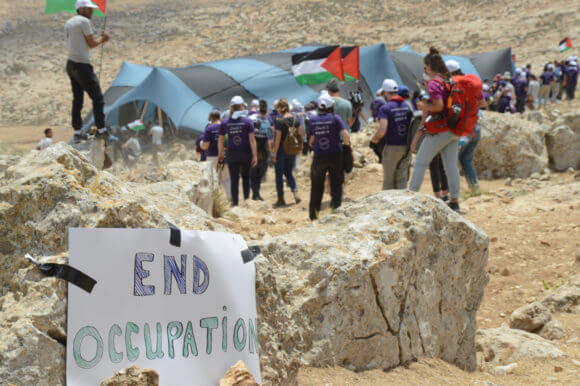
The Freedom Camp restored Fadal Amar and his family to their home. Amar, 55, said his family lived in Sarura until they were evicted 20 years ago in 1997. He claimed he held an Ottoman tabu, or land deed to the property, and pointed to a nearby cave where he said his brother was born,
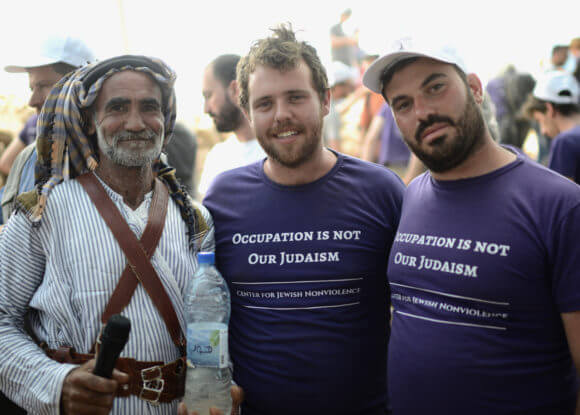
Sarura villagers and members of the Sumud Freedom Camp were determined to hold space for as long as they were able. They were prepared to engage in direct actions centered around nonviolent civil disobedience, risking injury or arrest, to accomplish their goals. They were motivated to demonstrate that everyone who lives in the land belongs there, and everyone who belongs there deserves the right to live in dignity and freedom.
The IDF attacked the camp on Saturday night about 11 p.m. The IDF removed the tent poles, which collapsed the tents, and they confiscated the generator. Participants who attempted to protect the generator suffered minor injuries. No one was arrested.
Sumud Freedom Camp recovered from the IDF attack and replenished their supplies. Most CJNV participants left by Sunday night leaving a core of CJNV people and Palestinians. A second and more serious attack happened on Thursday, the seventh day of the Sumud Camp, when the IDF destroyed the camp, took away tents, and attempted to push protesters out.
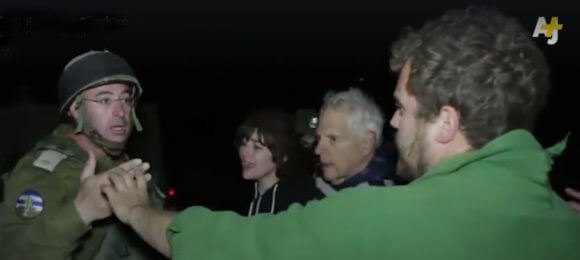
But the Camp remains in place. By mid-afternoon, all military and police had left. The tents are gone, but materials and other supplies remain. At least one CJNV member was detained and released by the IDF. No one was arrested.
CJNV considers it a tremendous victory that the camp, even though it is in tatters, remains for seven days. CJNV Director Ilana Sumka called it “unprecedented.” But the effort will almost surely be futile.
Everyone hoped the action would succeed in restoring Palestinian families to their homes, but many anticipated that the IDF would enforce the occupation by breaking-up Sumud Freedom Camp, retaining Firing Zone 918, and again expelling the Palestinian families. It is a relief that no one was arrested and, so far, improvement to the land accomplished by the Camp remain.
CJNV participants and Israelis will go home, leaving the Palestinians’ fate again in the unfriendly hands of the IDF. CJNV participants take solace that the Sumud Freedom Camp coalition was invited by the Palestinian residents of Sarura, and acted under Palestinian leadership to protect and support Palestinian community members.
Lectures and Discussion
The first four days of the CJNV mission were taken up with lectures, discussions, and a few hours physical work helping Palestinian cope with the occupation in some of the most difficult areas in the West Bank. There were two substantial talks.
The first was by Sami Awad, Executive Director and Founder of the Holy Land Trust in Bethlehem. He presented the Palestinian framing of the conflict, starting with the “historic concession” Arafat made in 1988 when he recognized Israel and was ready to accept a Palestinian state in the West Bank, East Jerusalem, and the Gaza Strip – only 22 percent of Mandate Palestine. Awad insisted that Palestinians should not make any further concessions. Awad also demanded a full right of return—not just to a Palestinian state, but to Palestinian’s original homes wherever they may be. He then claimed that Palestinians would accept a state on the 1967 Green Line.
The other substantive talk was by three Israeli Mizrahi women: Noam Shuster-Ellassi, Idan Avidani, and Sapir Sluzker-Amran. They described discrimination against Mizrahi (Sephardic and Middle Eastern) Jews in Israel by the dominant Ashkenazi (European Jews). They suggested that to resolve the Palestinian issue, Israel must first resolve discrimination against Mizrahi Jews.
The rest of the talks and over 15 Mishpacha (family) discussion groups were “new-age” touchy-feely efforts to help participants get in touch with their emotions.
Work Groups
CJNV participants were divided into six work groups to provide direct assistance to a few Palestinian families, and to support CJNV’s Palestinian partners. Partner sites were: (1) Silwan in East Jerusalem near the Old City where settlers and the IDF regularly abuse children as well as adult Palestinians; (2) Issawiya on Mount Scopus in East Jerusalem where the Hebrew University keep appropriating Palestinian land making access difficult and tortuous; (3) Umm al-Khair in the South Hebron Hills that has suffered several rounds of house demolitions and settlers destroyed the village’s generation-old tabboun, an outdoor clay Bedouin bread oven; (4) Susiya in the South Hebron Hills where the Israeli government declared the area an archaeological site forcing the residents to move into caves where the Palestinians continue to face military harassment, demolitions, and attempted expulsions; and (5 and 6) al-Khalil, or Hebron, where a portion of the city has been closed to Palestinians to make way for radical settlers who abuse the Palestinians, hoping to force them out.
I was part of one of the Hebron groups that worked under the direction of Issa Amro, director of Youth Against Settlements. We pulled weeds, cleaned trash, and planted flowers adjacent to a Palestinian home in Tel Rumeida, a home that is adjacent to the home of a radical and violent settler leader. We were scheduled to work for eight hours, but actually worked about five.
This work will not have much significance. It made a small but transitory improvement in a few people’s lives, but left the overall situation intact. Regardless of the ineffectiveness of the work groups, the 2017 CJNV mission was successful, if for nothing else than 133 Diaspora Jews who spent nine days in the Bethlehem fighting the occupation. That is a message political leaders must hear.
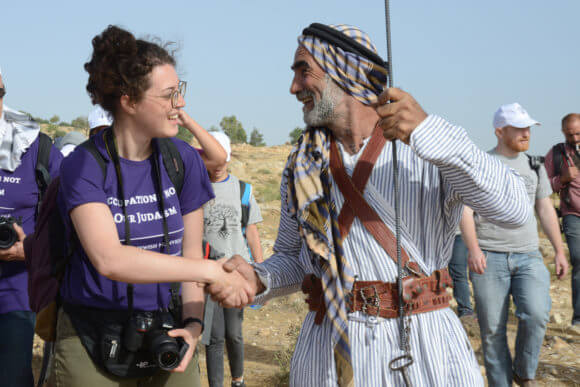

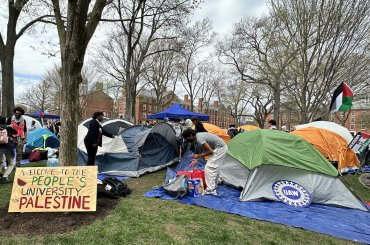
Justice is a universal spiritual principle. It was one of God’s final instructions to Moses. These Jews are in deed worthy of being called “lamps unto the nations”.
Dear Jeff,
Thank you for participating and sharing your efforts.
Truly, just as Islam is often hijacked by extremists and used to wage a battle that is so incredibly un-Islamic, so is Judaism hijacked by zionists in The modern state of Israel, which is about as tragically and counter-intuitively “un-Jewish” as can be.
Keep up the good work!
Wonderful report!
Re the title: please stop using Zionist ideological terminology for us. The youngest Jewish diaspora today is Israel. It is the diaspora of the ancient Jewish communities in the Middle East and Europe, and to a lesser extent, the centuries-old Jewish community of North America.
We are the center, they are the frontier – no matter what Amos Oz and Binyamin Netanyahu say.
@Elliot
“Re the title: please stop using Zionist ideological terminology for us. The youngest Jewish diaspora today is Israel. It is the diaspora of the ancient Jewish communities in the Middle East and Europe, and to a lesser extent, the centuries-old Jewish community of North America”
Perhaps we should refer to the Zionist “Diaspora” as “Disparate” ?
I thank Mr. Warner and his colleagues for their good work — but like others, I was taken aback to see the use of the term “Diaspora Jews”, which is a messianic construct used by the Zionists to affirm their “right” to expropriate Palestine. I am from a Christian background. Christianity was born in Palestine. I am not a “Diaspora Christian”.